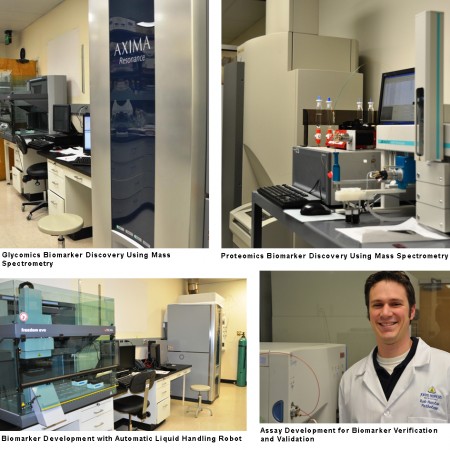Proteins play essential roles in every cellular process including the catalysis of biochemical reactions, structural functions to maintain cell shape, and cell signaling. Therefore, the analyses of proteins are essential to the understanding of biological systems and the mechanism of disease progression. Specific proteins are being discovered as biomarkers or therapeutic targets to improve disease diagnosis, prognosis, or treatment outcomes. Studies on proteins include the level of protein expression in a cell type or tissue, post-translational modifications, the functions of protein and their modified forms, as well as protein-protein interactions. The association of a specific protein and its modified form could be used for diagnosis, prognosis, or treatment of diseases. Investigations of interesting questions about proteins rely on sensitive methods for efficient protein isolation, detection, and quantification.
The field of “proteomics” has emerged and grown since the global analyses of structures and functions of proteins almost two decades ago following progress on the Human Genome Project. Advances in proteomics research have been facilitated with new technological breakthroughs in mass spectrometry instrumentation, as well as high-throughput protein production and array technologies. Proteomics research has three developmental phases. The first phase is the rapid development in mass spectrometry instruments, protein isolation and separation technologies, computational tools for protein identification, quantification and bioinformatic analysis. The second phase is the application of proteomic technologies for cataloging and quantitative analysis of proteomes such as different cells, tissues, body fluids, organs, and simple organisms like bacteria, yeast, and drosophila, as well as subproteomic analyses such as organelle proteomics, phosphoproteomics, glycoproteomics, acetylated proteomics, and other types of modified forms of proteomics, as well as interactive proteomics. As a result of these efforts, a number of protein databases have been established to document these characterizations and provide repositories to store new protein identifications. Analyses of the databases using statistical and bioinformatic tools have identified a number of potential disease biomarkers. The third phase of proteomics is the accurate, reproducible, and high throughput quantitative proteomics for verification and validation of targeted proteins identified from genomic and proteomic discovery with the purpose of developing new disease-associated proteins for personalized medicine. The result of this development is the creation of “Clinical Proteomics” with special emphasis of the application of proteomic technologies to all aspects of clinical investigations including academic, clinical laboratory, pharmaceutical, and diagnostic settings.
The applications of proteomic technologies in Pathology are facilitated by the establishment of the Center for Biomarker Discovery and Translation (CBDT). The CBDT is the home for a multidisciplinary team of outstanding scientists and clinicians. It is managed by three principal investigators: Dr. Daniel W. Chan (Director of both the CBDT and the Clinical Chemistry Division), Dr. Zhen Zhang (Director of Bioinformatics and Biostatistics), and Dr. Hui Zhang (Director of Proteomics). The three PIs have very different yet complementary expertise, training, and experience. Dr. Chan is an expert in clinical proteomics and clinical chemistry who has many years of experience in managing complex, multicenter collaborative projects on cancer biomarkers. Examples include the Biomarker Reference Laboratory of the National Cancer Institute’s Early Detection Research Network (NCI EDRN) and many FDA studies for the diagnostic industry. Dr. Hui Zhang is an expert in proteomic technologies including mass spectrometry and affinity-based methods. Dr. Zhen Zhang is an expert in bioinformatics and biostatistics and has published extensively in bioinformatics. He has the unique ability to communicate with many cancer biologists, oncologists, computer scientists, and mathematicians in their native language. Drs. Daniel Chan and Zhen Zhang developed the first FDA-cleared in-vitro diagnostic multivariate index assay, the OVA1 test for ovarian cancer.
The Center is equipped with a number of proteomic instruments including four mass spectrometers, two liquid chromatography systems, and a protein array platform for proteomic characterizations. In addition, we have two liquid handlers for automated sample processing and protein chemistry and molecular biology platforms for biological and clinical validation of disease-associated proteins.
The Center is currently conducting several research projects funded as a Biomarker Developmental Laboratory and a Biomarker Reference Laboratory under the NCI EDRN. Our research also includes technology development and biomarker discovery projects for the Johns Hopkins Proteomic Innovation Center in Heart Failure of NHLBI led by Dr. Jennifer Van Eyk (Cardiology). We are also doing proteomics research associated with the Programs of Excellence in Glycosciences (PEG) of NHLBI, led by Dr. Gerald Hart (Biological Chemistry).
Recently the NCI funded five Proteome Characterization Centers (PCCs) including our own CBDT, with Drs. Daniel W. Chan, Hui Zhang, and Zhen Zhang as PIs. The primary goal of the PCCs is to comprehensively characterize tumors and biospecimens in order to systematically identify, prioritize, and verify cancer-related proteins for the development of biomarkers. The proteomic technologies for cancer proteome characterization include protein microarray, immunoassays, and mass-spectrometry-based methods. The aim is to bridge genomic and proteomic discoveries to medicine using proteomic technologies.
Finally, the overall goals of the Center for Biomarker Discovery and Translation are to develop, validate, and translate multiplex test systems to enable the measurement of multiple proteins simultaneously and quantitatively with improved sensitivity and specificity.

Hui Zhang, Ph.D.
Assistant Professor of Pathology
Director of Proteomics, Center for Biomarker Discovery and Translation